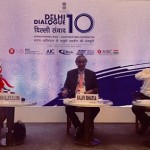These remarks were given by Rajiv Bhatia, Distinguished Fellow, Foreign Policy Studies, Gateway House as chair of the session on Tourism Cooperation at Delhi Dialogue X on July 20, 2018. Click here to read details of the event.
In the context of India-ASEAN relations and the larger East Asian region, tourism has implications for all the three Cs of India’s Act East Policy: Commerce, Connectivity and Culture.
The Delhi Declaration of the ASEAN-India Commemorative Summit to mark the 25th Anniversary of ASEAN-India Dialogue Relations, issued on 25 January 2018, made several specific references to the vital goal of tourism expansion. It called for establishing closer ASEAN-India air links “to promote tourism, trade and enhance greater connectivity” between ASEAN and India. It also underlined the need for cementing a stronger cultural link by promoting “cultural tourism and further enhancing people-to-people contacts.”
Tourism is viewed both as an important form of and a key device for fostering socio-cultural cooperation between our two regions.
Hence, this session intends to examine in depth not the goal but the question of how to achieve it more effectively and on a much broader scale, so that the overall echo-system improves, the quality and diversity of services and products offered to tourists go up and, as a result, the number of tourists exchanged increases substantially.
Over a million Indians visit ASEAN countries every year, states the concept note of this conference, but I have seen statistics that indicate that ASEAN received in 2015 a total of 102 million tourists out of which 3 million tourists came from India. Over 80% of Indian tourists visited only three ASEAN countries, namely Malaysia, Singapore and Thailand. In the reverse direction, the number of ASEAN tourists to India is still rather low. Evidently, ASEAN strategies and best practices to promote tourism need to be studied and internalised by us in India.
What are the challenges, obstacles and roadblocks that hamper further expansion of tourism? How can they be removed? Which areas need special thrust? How to make tourism a truly two-way exchange that benefit a much larger segment of our societies, creating employment, increasing opportunities for recreation and cultural immersion, and educating our young generation about the rich cultural heritage of our shared past. These questions will be addressed by our panelists.
We will perhaps attempt to cover tourism in all relevant sectors: cruise, cultural heritage, spiritual, education, medical and business. We shall discover that increasing maritime and air connectivity, enhancing investment, launching sustained marketing campaigns, and improving visa regimes may be highly desirable. We may also strive to identify the priorities and responsibilities of various stakeholders, perhaps suggesting the need for greater practical coordination among them.
In this context, it is heartening to note that 2019 will be celebrated as ‘the ASEAN-India Tourism Year.’ Thus, the consensus of views emerging from this session could produce valuable inputs for the policy-makers in our region for their immediate use.
Our distinguished panel comprises senior government officials and reputed representatives of the tourism industry.
May I now call upon Ms. Rashmi Verma, Secretary, Ministry of Tourism, and Government of India, to deliver her special address.
Rajiv Bhatia is Distinguished Fellow, Foreign Policy Studies, Gateway House
These remarks were given at Delhi Dialogue X on July 20, 2018. Click here to read details of the event.
For interview requests with the author, or for permission to republish, please contact outreach@gatewayhouse.in.
© Copyright 2018 Gateway House: Indian Council on Global Relations. All rights reserved. Any unauthorized copying or reproduction is strictly prohibited


